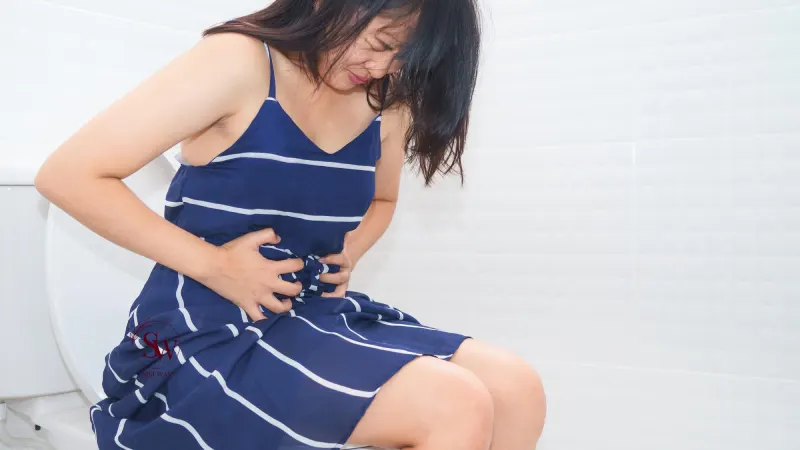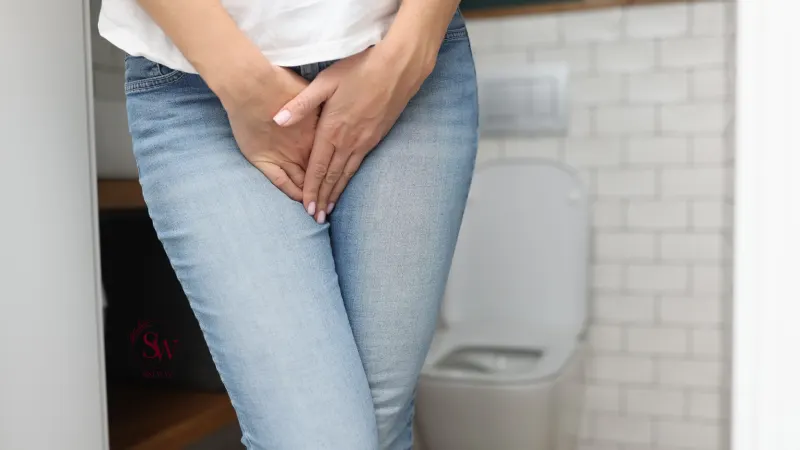
Symptoms of Kidney Stones in Ladies
Kidney stones, also known as renal calculi, are hard mineral and salt deposits that form within the kidneys. While both men and women can develop kidney stones, women often experience unique symptoms and challenges related to this condition. Understanding the symptoms specific to women can help in early detection and prompt treatment. This article aims to shed light on the common kidney stone symptoms experienced by women, emphasizing the importance of recognizing these signs and seeking appropriate medical attention.

Pain and Discomfort:
Pain and discomfort are hallmark symptoms of kidney stones in women. The presence of a kidney stone can cause intense and acute pain that is typically felt in the side or back, and may radiate to the lower abdomen and groin. The severity of the pain can vary depending on the size and location of the stone. Women with kidney stones often describe the pain as sharp, stabbing, or cramping. The pain can come in waves and may be accompanied by restlessness, agitation, and an inability to find a comfortable position. It’s important to note that the pain may fluctuate in intensity as the stone moves through the urinary tract. If a woman experiences severe or persistent pain that is suspected to be related to kidney stones, it is crucial to seek medical attention for proper evaluation and management.
In addition to the acute pain, kidney stones can also cause chronic discomfort in women. Even when the stone is not actively passing through the urinary tract, women may experience a dull, nagging ache or discomfort in the affected area. This chronic discomfort can be bothersome and impact daily activities and quality of life. It’s important for women experiencing ongoing discomfort or pain to consult with a healthcare professional to identify the underlying cause and develop an appropriate treatment plan. Proper management of kidney stones can help alleviate pain and discomfort, and prevent complications associated with the condition.

Changes in Urinary Patterns:
Kidney stones in women can affect urinary patterns in women. Symptoms may include:
– Frequent urination: Women with kidney stones may feel the need to urinate more often than usual.
– Urgency: There may be a sudden and urgent need to urinate even if the bladder is not full.
– Difficulty urinating: Kidney stones can obstruct the urinary tract, causing difficulty in passing urine or only producing small amounts at a time.
– Blood in urine: Hematuria, or the presence of blood in the urine, is a common symptom of kidney stones. It may appear pink, red, or brown.

Nausea and Vomiting:
One of the common reasons for nausea and vomiting in women with kidney stones is the pain associated with the condition. Kidney stone pain can be severe and excruciating, causing waves of intense discomfort. This intense pain originates from the kidneys and may radiate towards the lower abdomen and groin. It can trigger a physiological response in the body, leading to feelings of nausea and, in some cases, vomiting. The severity and persistence of the pain can contribute to the development of these symptoms, as the body’s natural response to significant pain can include gastrointestinal distress.
Additionally, the presence of a kidney stone can lead to ureteral obstruction. When a stone obstructs the flow of urine from the kidney to the bladder, it can cause urine to back up, increasing pressure within the kidney and the urinary tract. This increased pressure can result in the stretching and irritation of the renal tissue, triggering a response in the body that includes nausea and vomiting. The obstruction can also cause inflammation and distention of the renal pelvis, which may further contribute to these symptoms. Therefore, the combination of pain and obstructive effects of kidney stones can lead to gastrointestinal symptoms like nausea and vomiting in affected women.

Urinary Tract Infections (UTIs):
Women with kidney stones are at an increased risk of developing urinary tract infections (UTIs). The presence of a kidney stone can create an environment that promotes bacterial growth and increases the likelihood of infection. The stone itself can act as a nidus, providing a surface for bacteria to adhere to and multiply. The obstruction caused by the stone can also impede the natural flow of urine, allowing bacteria to multiply and cause infection. Symptoms of a UTI include frequent urination, a burning sensation during urination, cloudy or foul-smelling urine, and sometimes fever. It’s important for women with kidney stones to be aware of these symptoms, as prompt diagnosis and treatment of UTIs can prevent the infection from spreading to the kidneys and causing more serious complications.
Furthermore, the presence of kidney stones can cause physical irritation and inflammation in the urinary tract, making it more susceptible to bacterial colonization. The rough surfaces of the stones can cause micro-abrasions in the urinary tract lining, providing entry points for bacteria. Additionally, the stagnant urine that may accumulate behind or around the stone can create an environment favorable for bacterial growth. It’s essential for women with kidney stones to maintain good urinary hygiene, drink plenty of fluids, and promptly report any symptoms of a UTI to their healthcare provider. Early detection and treatment of UTIs in conjunction with kidney stones can help prevent the spread of infection and optimize overall urinary health. If you would like to learn more about urinary tract infections (UTIs) and how women can develop them, you can read the article titled “How does a Woman Get a Urinary Tract Infection?“

- Other Symptoms:
Additional symptoms that women may experience include:
Cloudy or Foul-Smelling Urine
Cloudy or foul-smelling urine can be a symptom associated with kidney stones in women. When kidney stones are present, they can cause irritation or inflammation in the urinary tract. This irritation can lead to changes in the appearance and odor of urine. Cloudy urine may indicate the presence of minerals, debris, or pus in the urine, which can be associated with kidney stones. The foul smell of urine can occur due to the presence of bacteria or an infection in the urinary tract, which can be secondary to the kidney stones. If a woman notices that her urine appears cloudy or has a strong, unpleasant odor, it is advisable to consult a healthcare professional for further evaluation and appropriate management.
It’s important to note that cloudy or foul-smelling urine can also be a sign of other urinary tract issues or infections unrelated to kidney stones. However, when accompanied by other symptoms such as pain, changes in urinary patterns, or discomfort during urination, it may suggest the presence of kidney stones. A healthcare professional can perform tests, such as a urinalysis or imaging studies, to determine the underlying cause and provide appropriate treatment. Timely diagnosis and management of kidney stones can help alleviate symptoms, prevent complications, and promote urinary health in affected women.

Fever and Chills
Fever and chills can be symptoms associated with kidney stones in women, particularly when there is an accompanying infection. When a kidney stone obstructs the urinary tract, it can create a stagnant environment where bacteria can multiply and cause an infection. This infection, known as pyelonephritis, can lead to systemic symptoms such as fever and chills. The body’s immune response to the infection triggers an elevation in body temperature, resulting in a fever. Chills may also accompany the fever as the body attempts to generate and maintain heat. If a woman with kidney stones experiences a persistent fever accompanied by chills, it is important to seek medical attention promptly to evaluate for possible infection and initiate appropriate treatment.
It is worth noting that not all kidney stones will cause an infection and subsequent fever and chills. However, in cases where there is an obstruction and accompanying infection, these symptoms may arise. It is essential to differentiate between symptoms caused solely by the presence of kidney stones and those indicating an infection. If a woman with kidney stones experiences fever and chills, it is crucial to consult a healthcare professional for a comprehensive evaluation, as prompt treatment of any associated infection is necessary to prevent complications and promote recovery.

Abdominal Bloating or Distention
Abdominal bloating or distention can be a symptom of kidney stones in women. When a kidney stone obstructs the urinary tract, it can interfere with the normal flow of urine from the kidneys to the bladder. This obstruction can lead to a buildup of urine in the affected kidney, causing the kidney to become distended. As a result, women may experience a sensation of abdominal bloating or distention. The bloating can be accompanied by discomfort or a feeling of fullness in the abdomen. It’s important to note that abdominal bloating or distention can also be caused by other factors, so it is advisable to consult a healthcare professional for a proper evaluation and diagnosis.
Additionally, abdominal bloating or distention can occur as a result of the body’s response to the pain associated with kidney stones. The intense pain caused by kidney stones can trigger a physiological response that includes muscle tension and spasms in the abdomen. These muscle contractions can contribute to a feeling of bloating or distention. It’s worth noting that abdominal bloating or distention can have various causes, ranging from gastrointestinal issues to hormonal changes. Therefore, it’s important to consider other accompanying symptoms and consult a healthcare provider to determine the underlying cause of abdominal bloating or distention in women with suspected or diagnosed kidney stones.

Painful Sexual Intercourse
Painful sexual intercourse, known as dyspareunia, can be associated with kidney stone symptoms in women. The presence of kidney stones can lead to discomfort and pain in the lower abdomen and pelvic region, which can be exacerbated during sexual activity. The movement and pressure exerted during sexual intercourse may cause increased pain or discomfort in women with kidney stones. The pain can be localized to the lower abdomen, back, or groin area, depending on the size and location of the stones. It’s important for women experiencing painful sexual intercourse to consider the possibility of kidney stones and seek medical evaluation to determine the underlying cause and appropriate treatment.
Furthermore, kidney stones can cause referred pain, which means that discomfort or pain originating from the kidney stones can be felt in other areas, including the pelvic region. The radiating pain from the stones can be felt during sexual activity and may interfere with pleasure and intimacy. It’s essential for women to communicate any pain or discomfort experienced during sexual intercourse to their healthcare provider. Addressing the underlying cause, such as kidney stones, can help alleviate symptoms and restore comfort during sexual activity. Open communication with a healthcare professional can guide appropriate management strategies and improve overall quality of life.

Kidney Stone Early Symptoms in Females
Kidney stones can cause significant discomfort and complications if left untreated. Recognizing the early symptoms of kidney stones in females is crucial for timely intervention and effective management. In the following, we will discuss kidney stone early symptoms in females.
-
Mild to Moderate Pain:
In the early stages of kidney stone formation, women may experience mild to moderate pain. The pain can manifest as a dull ache in the back, lower abdomen, or sides. It may come and go initially, and may be mistakenly attributed to other conditions. However, if you notice recurrent or persistent pain in these areas, it is important to consider the possibility of kidney stones.
-
Changes in Urinary Patterns:
Early symptoms of kidney stones can affect urinary patterns in females. Pay attention to the following signs:
– Increased frequency of urination: You may find yourself needing to urinate more often than usual, even during the night.
– Urgency: There may be a sudden and compelling urge to urinate, sometimes with little urine produced.
– Difficulty urinating: Early-stage kidney stones can cause discomfort or a sense of blockage during urination. You may experience difficulty initiating urine flow or feel incomplete emptying of the bladder.
– Cloudy or foul-smelling urine: The presence of kidney stones can sometimes result in changes in urine appearance, such as cloudiness or an unpleasant odor.
-
Blood in Urine:
Hematuria, the presence of blood in the urine, is a common early symptom of kidney stones. You may notice pink, red, or brown discoloration in your urine. It is important to note that blood in the urine can also indicate other conditions, so consulting a healthcare professional is crucial for an accurate diagnosis.
-
Discomfort during Passing Urine:
Some women may experience discomfort or a burning sensation while passing urine. This symptom, known as dysuria, can be an early indication of kidney stones. If you experience pain or discomfort during urination, it is advisable to seek medical attention for further evaluation.
-
Generalized Discomfort:
In some cases, women may experience a general sense of discomfort or unease in the abdomen or pelvic area. This discomfort may be vague and difficult to pinpoint, but if it persists or worsens, it is important to consider the possibility of kidney stones.
FAQ
- What are the common symptoms of kidney stones in women?
Common symptoms of kidney stones in women include severe pain in the side or back, which may radiate to the lower abdomen and groin. Other symptoms can include blood in the urine (hematuria), frequent urination, a burning sensation during urination, cloudy or foul-smelling urine, and urinary urgency. Nausea, vomiting, abdominal bloating, and fever may also be present in some cases.
- Can kidney stones cause urinary tract infections (UTIs) in women?
Yes, kidney stones can increase the risk of urinary tract infections (UTIs) in women. The presence of a kidney stone can create an environment that promotes bacterial growth and increases the likelihood of infection. The obstruction caused by the stone can prevent normal urine flow, allowing bacteria to multiply and cause an infection. Symptoms of UTIs include frequent urination, pain or burning during urination, cloudy or strong-smelling urine, and sometimes fever.
- Are there any specific symptoms of kidney stones in pregnant women?
Kidney stones can occur during pregnancy, and the symptoms can vary. Pregnant women with kidney stones may experience similar symptoms to those who are not pregnant, such as severe pain, blood in the urine, and urinary urgency. However, due to the anatomical and physiological changes that occur during pregnancy, the symptoms may be more challenging to distinguish. It is important for pregnant women experiencing any unusual symptoms or discomfort to consult with their healthcare provider for proper evaluation and management.
Conclusion:
Recognizing the symptoms of kidney stones in women is crucial for early diagnosis and appropriate treatment. If you experience any of the aforementioned symptoms, it is important to consult a healthcare professional for a proper evaluation. Prompt medical attention can help alleviate pain, prevent complications, and guide the most suitable treatment options. Remember, early detection and proactive management are key to effectively managing kidney stones and maintaining optimal urinary health.



